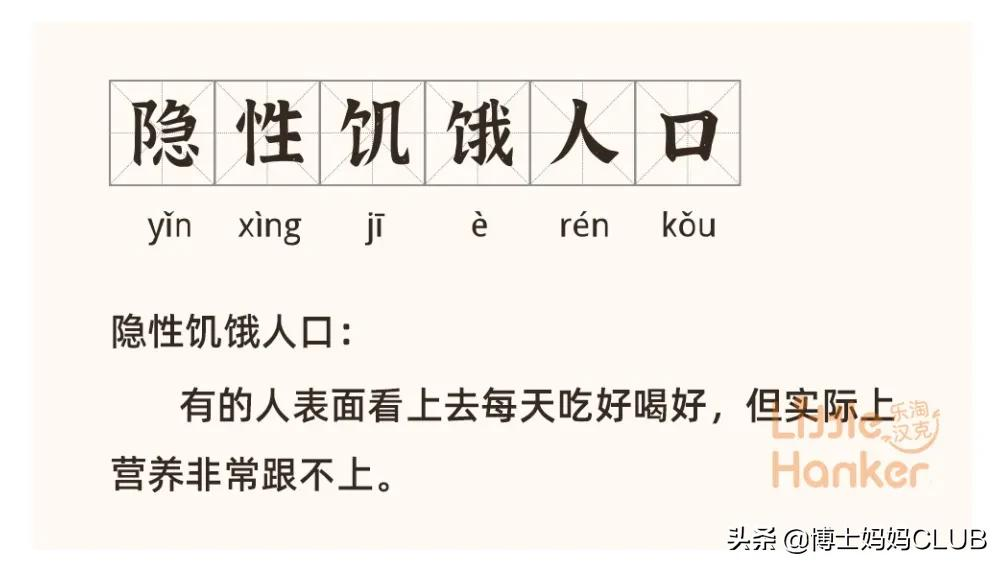Children eat more and eat enough, is not the same as eating well, to be wary of the emergence of "hidden hunger".

The WHO refers to inadequate or nutritional imbalances in nutrient intake as "hidden hunger.".
That is to say, hidden hunger is due to the body's unbalanced nutritional intake or lack of certain vitamins and minerals, while over-intake of other nutrients, resulting in hidden nutritional needs of hunger symptoms.
The State of the World's Children 2019 report shows that at least one-third of children under the age of five are undernourished or overweight, and half suffer from "hidden hunger", which affects the immunity, growth and cognitive abilities of millions of children.
√ Stunted growth
√ Immunodeficiency and tissue dysplasia
√ Poor health and increased risk of death[1]
The most common "hidden hunger" are: iron deficiency, zinc deficiency, vitamin A deficiency, vitamin D deficiency.
Take "iron deficiency" as an example:
Infant iron deficiency can damage their cognitive ability and irreversible neurodevelopmental damage, and long-term iron deficiency impairs muscle oxidative metabolism and reduces physical endurance and exercise ability;
Iron deficiency in children affects growth and intellectual development, and is irritable; iron deficiency also affects cell-mediated immune function and reduces the body's ability to fight infections;
Iron deficiency in pregnant women is associated with preterm birth, low birth weight infants, and fetal death [2-3].
Tip: Babies who have the above manifestations need to be comprehensively assessed in combination with growth and development and nutritional status.
Some unreasonable dietary arrangements, feeding methods, and eating habits will lead to unbalanced dietary nutritional intake, and even the lack of micronutrients, resulting in "hidden hunger".
The stomach capacity of infants and young children is already small, coupled with the single type of food that can be eaten, it is easy to have a micronutrient deficiency caused by unbalanced nutritional intake.
For example, if a 6-month-old child does not add iron-rich foods in time, the child cannot get enough iron from the diet and is prone to iron deficiency or even iron deficiency anemia.
(1) Do not like to eat, love to eat snacks
(2) Only love to eat staple foods
(3) Picky eater, do not like to eat vegetables, only eat meat
(4) Fast foods such as fried and hamburgers are favorites
(1) The most effective way to avoid "hidden hunger" is to eat a balanced diet,
● Babies should continue to breastfeed after reaching the age of 6 months and gradually introduce a variety of foods
● Infants and young children who cannot breastfeed or have insufficient breast milk should choose formula as a supplement to breast milk
● First add iron-fortified baby rice noodles, minced meat and other iron-rich slime foods
● Supplementary food gradually enriches the types of food: meat, eggs, poultry, fish, vegetables, fruits, cereals (see balanced diet pagoda for reference intake)
● Vegetable oil should be added in an appropriate amount to supplement food[4]
Attached to the 7-24 months old infant balanced diet pagoda for your reference, more dietary pagodas can be obtained by leaving a message.
(2) The daily diet should be nutritionally balanced
Parents' cognition of dietary nutrition directly affects the child's intake of food, parents should have a general understanding of the nutritional composition of various types of food, and the daily meals produced should ensure a balanced nutrition.
At the same time, parents' good eating behavior has an important impact on children, and it is recommended that parents should lead by example, teach by example, and play a good role model.
(3) Preventive supplementation of essential nutrients that babies are prone to lack
In January 2021, the Child Health Branch of the Chinese Preventive Medicine Association issued the "Expert Consensus on the Clinical Application of Vitamin A and Vitamin D in Children in Chinese Children" to promote:
● Add vitamin A1500 to 2000 IU/d from birth to 3 years old;
● To prevent rickets, it is recommended that newborns start supplementing with vitamin D at 400-800 IU per day as early as possible after birth to prevent vitamin D deficiency and insufficiency and ensure the growth and development needs of infants and young children [5].
In addition to the above suggestions, it is also necessary to take the child to the hospital regularly for physical examination and pay attention to the child's development indicators.
If there is a problem, according to the doctor's advice, on the basis of a reasonable diet, supplement the relevant nutrients.
bibliography
[1] UNICEF. The State of Children 2019.
[2] Maggini S, Pierre A, Calder P C. Immune Function and Micronutrient Requirements Change over the Life Course[J]. Nutrients,2018,10(10).
[3] Saeed F, Nadeem M, Ahmed R S, et al. Studying the impact of nutritional immunology underlying the modulation of immune responses by nutritional compounds-areview[J]. FoodandAgricultural Immunology,2016,27(2):205-229.
Chinese Nutrition Society. Dietary guidelines for Chinese residents (2016)[M]. Beijing:People's Medical Publishing House,2016.]
Chinese Preventive Medicine Child Health Branch. Expert Consensus on the Clinical Application of Vitamin A and Vitamin D in Chinese Children, Chinese Journal of Health Care, 2021.